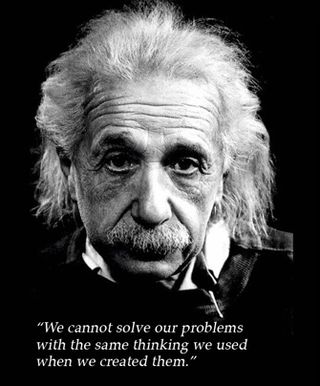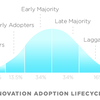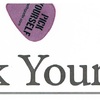Yes the whole content system is a mess. Newspapers, magazines, book publishing, music, movies and now TV - all are old school content business models that are in a state of upheaval. Unfortunately, the people in charge of these content systems are fighting the change that is happening - happening in large part because of the Internet - instead of trying to start making changes NOW.
The Arab Spring of 2011 was a similar model: change was coming in the form of popular protests, furthered by social networks and the Internet, fought bitterly and fatally by the regimes in place, but to what end? Many dead and injured BUT CHANGE HAPPENED ANYWAY!
Many thought that after Napster, the music industry would stop being stupid and embrace the new music distribution models evolving. The Industry didn't, but the artists who did - like OAR, Dave Matthews Band and Pearl Jam (to name a few of my favorites) - have been hugely successful and profitable.
Why can't the rest of the Industry see that?
Radio is one way to listen to music, but let's face it, listening to the same 100 songs plus the syndicated DJ's is annoying. Because of consolidation in radio station ownership, the powers that be can only look at the bottom line. Wrong place to look. **Successful businesses think about Employees and Customers **(in that order). From that viewpoint can a successful business model is executed.
Albert Einstein said, "Try not to become a man of success but rather to become a man of value." I take that to mean, "Give Value First and Foremost." All else flows from that.
With SOPA and ProtectIP, the RIAA and the MPAA hope to legislate morals nd protections. Why? Why not just give your customers what they want, the way they want it? Isn't that what a vendor is supposed to do?
After Napster, there were numerous other P2P sites like Limewire that popped up. Then a number of online radio sites, like Pandora, Grooveshark, Spotify, Rdio, and more. All have had some fight with the RIAA over licensing. Now we have Google Music, Amazon Cloud Player and Apple's iCloud, too. Do you see a pattern here? People want to listen to what they want, when they want, where they want, on the device of their choosing.
My buddy suggested that their be a website to donate directly to an artist. For example, you downloaded - legally or illegally - a song or album that you liked so much, you wanted to give some money to the artist. That's not a bad way to do it.
One comedian, Louis CK, who is maybe a B list-er, just made over $1 million in revenue on a comedy show, Live at the Beacon, that he produced and distributed himself online at $5 per copy.
The Internet works as a model for distribution. The content is key. CK proved that. So do many authors who self-produce on Lulu and Kindle. [Maybe the key is micro-payments, which I will define here as anything under $6.]
TechDirt is probably the one website that I read that is on top of the copyright-distribution-legislation issues. In a recent article, TechDirt kind of sums up the consumer thinking that WB (and others in the Netflix fight) don't understand: "It appears that WB is implicitly admitting that the strategy of delaying the rental period of a movie by 28 days has been a total failure, in the decision to increase the delay to 56 days. They're basically admitting that not enough people were "buying" in those 28 days... so they somehow think that doubling the wait will increase the purchases. It won't. If people really want to pay the extra money to buy the DVD, they're likely to do so pretty early on. It's not like they're waiting 50 days in and then saying "gee, I can't rent the movie, so I'll just pay a lot more money than necessary to own an obsolete piece of plastic." " BINGO!
People want to stream their content - video, music, TV, movies, etc. - through whatever device they have - blu-ray, xbox, PS3, Roku, GoogleTV, AppleTV, laptop, tablet, etc. [Same holds true for blogs, magazines, and books.]
TechDirt goes on to explain, "I do believe that [MPAA and RIAA] current strategies of alienating their best customers, relying on government protection, and pretending this is some sort of epic battle between good and evil aren't just doomed to fail, they're actively making things worse for themselves." [Sounds a lot like telco doesn't it?]
I'm not encouraging piracy. I actually despise it. We live in an immediate gratification culture. Vendors have to accept that.
We also live in an age where people expect a lot for free. Facebook is free, but people still bitch about it. So's this blog and same thing. Our Culture has a high expectation. It's about perceived value.
Content is really important. Government has to keep the masses entertained or they will revolt.
However, we have a spiraling problem: content costs a lot to make, while disposable income in America is declining. That combination is a disaster waiting to happen.
Let's look at the NFL. They just raised their fees to the TV channels that carry them by 60-70%! [Alan Quayle has a good piece on it.] So ESPN, which is already the most expensive TV channel for service providers to deal with, will be raising its rates to cover this cost. Even the extra $3.50 is just for one channel. What about all the other channels?
I have a rant about ESPN in general anyway. Are they really a sports channel??? Besides college bowl games and some college basketball, the only sport it televises is Monday Night Football, which had bad games all year. This creates a brand issue for them. PBA, Poker and other non-sport stuff is cheap to produce but it is just filler, since they can't run talk-shows and Sportscenter all day (just most of it). ESPN has the same issue as the music and movie industry: too much looking at profit, not enough good content to warrant the money.
We are seeing cord cutting, because the consumer dollars are decreasing -- and they would rather give up TV than cellphones. Cellphone bills average more than residential line bills used to. For a family of 4, it is easily 4 times what the home phone used to cost. Granted you can do more with it, but dollars are dollars. And with 16% of the population at poverty level start thinking what that means for the service economy engine - and all types of businesses.
You have economic and technological forces working to breakdown old school content systems. It will be interesting to see if any lessons are learned and applied in 2012. I highly doubt it because:














